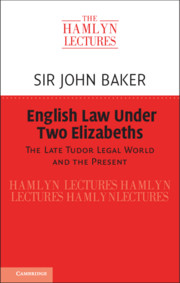Book contents
- English Law under Two Elizabeths
- English Law under Two Elizabeths
- Copyright page
- Contents
- The Hamlyn Trust
- The Hamlyn Lectures
- Preface
- Table of Statutes
- Table of Cases
- Abbreviations
- 1 The English Legal System under Elizabeth I
- 2 The Elizabethan Common Law
- 3 An Age of Common Law and an Age of Statute?
- 4 The Elizabethan Inheritance
- 5 Comparing Then and Now
- Index
4 - The Elizabethan Inheritance
Published online by Cambridge University Press: 19 January 2021
- English Law under Two Elizabeths
- English Law under Two Elizabeths
- Copyright page
- Contents
- The Hamlyn Trust
- The Hamlyn Lectures
- Preface
- Table of Statutes
- Table of Cases
- Abbreviations
- 1 The English Legal System under Elizabeth I
- 2 The Elizabethan Common Law
- 3 An Age of Common Law and an Age of Statute?
- 4 The Elizabethan Inheritance
- 5 Comparing Then and Now
- Index
Summary
This chapter focuses on comparison. It considers the effect on access to justice of abolishing the assizes and disposing of court buildings. Civil procedure has been transformed, formalism is less important, but there is eternal tension between practical efficiency and desire for absolute justice. Land law is less dominant today, even though for the first time a majority of householders are freehold-owners. Torts law has been transformed by the ever-expanding boundaries of negligence, though contract law looks very similar. While public law has moved in several new directions, judicial review’s roots are Elizabethan. Most of today’s human rights were recognised then. Judicial decisions have changed in character as a result of abolishing the civil jury; the public is less involved with traditional-type law. Debt-collection aside, horizontal disputes are less prominent than vertical claims, and tribunals have grown in importance. The complexity of statute-law and regulation today means that citizens have less understanding of the law than Elizabethans. One consequence is that the legal profession is ten times larger (in proportion to the population) than that of Elizabethan England.
Keywords
- Type
- Chapter
- Information
- English Law Under Two ElizabethsThe Late Tudor Legal World and the Present, pp. 143 - 193Publisher: Cambridge University PressPrint publication year: 2021



